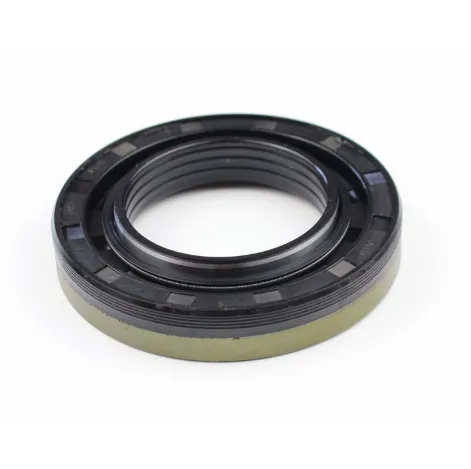Cassette Seals: A Comprehensive Guide to Modern Sealing Solutions
Cassette seals are a key innovation in sealing technology, providing enhanced protection for rotating shafts in heavy-duty applications such as agriculture, construction, mining, and off-road vehicles. Designed to handle extreme conditions, these seals offer long-term durability, reduced maintenance, and superior contamination resistance. In this article, we will explore what cassette seals are, the benefits they offer, and how to choose the right one using a cassette seal catalog. We'll also examine the role of cassette seals manufacturers in ensuring industry standards and performance.

What Is a Cassette Seal and How Does It Work?
A cassette seal also referred to as a seal cassette or cassette oil seal, is a pre-assembled, multi-lip sealing system enclosed in a single housing. Unlike conventional oil seals, which are single-lip and often exposed, cassette seals include multiple sealing lips, a garter spring, and internal grease—often combined with a dust exclusion barrier—all enclosed in a protective outer casing.
How Cassette Seals Work:
The rotating shaft passes through the central part of the cassette.
Several sealing lips (primary, secondary, dust) maintain tight contact with the shaft.
Grease inside the cassette lubricates the sealing lips and prevents dry running.
The enclosed design blocks out contaminants like dirt, mud, water, and abrasive particles.
Key Advantages:
Longer Service Life: Internal lubrication and dust protection reduce wear.
High Contamination Resistance: Ideal for rough environments like mining and agriculture.
Pre-lubricated Assembly: Reduces installation time and risk of damage during handling.
Integrated Design: Simplifies inventory and replacement procedures.
Applications and Benefits of Cassette Oil Seals
Cassette oil seals are most commonly used in wheel hubs, axle systems, transmissions, and power take-off (PTO) shafts of heavy equipment. The sealed unit allows for continuous operation in environments where dirt, moisture, and heavy vibration are present.
Industries and Applications:
Agricultural Equipment: Tractors, harvesters, and tillers often encounter muddy and dusty fields where debris can quickly damage traditional seals.
Construction Machinery: Excavators, loaders, and bulldozers benefit from the high-durability sealing systems provided by cassette seals.
Heavy-Duty Trucks and Trailers: Protecting wheel hubs from water and dust during long-haul operations.
Mining Equipment: High wear and abrasive environments require the enhanced protection cassette seals offer.
Performance Benefits:
Reduced Downtime: The extended service life minimizes the frequency of maintenance and part replacement.
Cost Efficiency: While initially more expensive than standard seals, their longevity and reliability reduce total cost of ownership.
Better Shaft Protection: Cassette seals also help prevent shaft wear by maintaining consistent contact pressure and lubrication.
Choosing the Right Seal: Using a Cassette Seal Catalog
When selecting a cassette seal, it’s critical to reference a cassette seal catalog provided by manufacturers. These catalogs list important product specifications, materials, dimensions, and application recommendations. Understanding the data in these catalogs helps maintenance teams and engineers match the correct seal to their equipment needs.
Catalog Information Typically Includes:
Inner and Outer Diameter Measurements
Seal Width and Housing Type
Material Composition (e.g., Nitrile, FKM, PTFE)
Operating Temperature and Pressure Ranges
Rotational Speed Ratings
Seal Design Features (single or multiple lip, dust exclusion)
How to Use the Catalog:
Identify the equipment and the shaft/housing measurements.
Match those with seal specifications in the catalog.
Choose seals based on environmental demands (e.g., mud, water, sand).
Cross-reference part numbers with OEM components if needed.
Some manufacturers also offer digital catalogs or online selection tools, allowing users to search by application, dimensions, or part numbers for faster identification.
The Role of Cassette Seals Manufacturers in Quality and Innovation
A reliable cassette seals manufacturer plays a critical role in delivering performance-grade products tailored to industry-specific needs. Manufacturers invest in R&D to enhance sealing lip design, material science, and installation procedures. They also adhere to international standards such as ISO 9001 or TS16949 to ensure consistent quality.
What to Look for in a Manufacturer:
Technical Expertise: Deep understanding of dynamic sealing systems and environmental challenges.
Customization Capability: Ability to produce seals for specific applications or dimensions.
Material Quality: Use of premium elastomers and metal casings for extended durability.
After-Sales Support: Technical guidance, installation support, and failure analysis services.
Some globally recognized cassette seals manufacturers include SKF, National (by Timken), and Freudenberg. Many regional producers also offer excellent performance and cost-effective solutions for OEMs and aftermarket customers.
The cassette oil seal is a smart solution for equipment that operates in tough, contaminant-heavy environments. Its enclosed design, pre-lubrication, and multi-lip configuration make it superior to traditional oil seals in terms of durability and protection. Whether you're sourcing from a global cassette seals manufacturer or browsing a cassette seal catalog, understanding your operational needs and environment is essential for choosing the right product.
If you’re working with demanding equipment, investing in a high-quality seal cassette can significantly reduce maintenance costs, extend equipment life, and improve overall performance.
-
Seal 12x20x5: Precision Radial Shaft Seals for Industrial Reliability
समाचार Nov.24,2025
-
Seal 12x18x5: Essential Guide to Specifications, Applications & Vendors
समाचार Nov.24,2025
-
Understanding Seal 12 20 5: Applications, Specifications & Industry Insights
समाचार Nov.23,2025
-
Durable Oil Seal 85x110x12 – Reliable Sealing Solutions for Industry
समाचार Nov.23,2025
-
Durable and Precise Oil Seal 75x95x10 for Efficient Machinery | YJM Seal
समाचार Nov.22,2025
-
Durable Oil Seal 75x100x10 for Reliable Industrial Performance | YJM Seal
समाचार Nov.22,2025
-
High-Quality Oil Seal 65x90x10 | Durable & Reliable Sealing Solutions
समाचार Nov.22,2025
उत्पादन कोटिहरु















